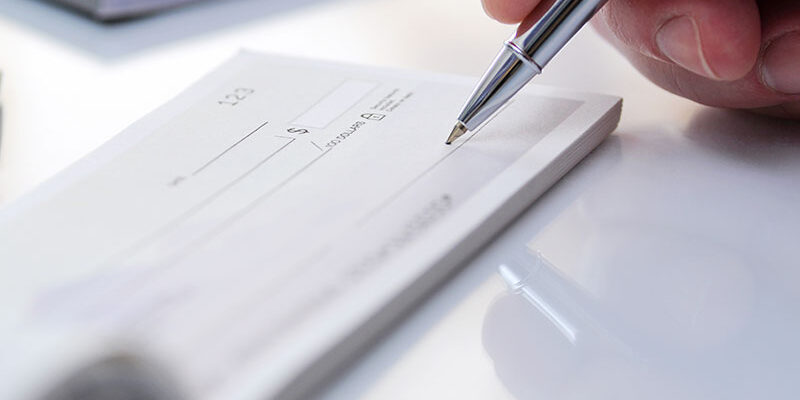Published in: Gulf News
Bounced cheque issuers can’t absolve themselves by merely clearing fines, warn judges
Dubai: Contrary to popular belief that those accused of issuing bounced cheques can come clean by paying the Legal Order fine in the UAE, a case of felony is registered in their record, officials in the Dubai judiciary told Gulf News.
Crimes under the UAE Penal Code are divided into three categories depending on the seriousness of the punishment that may be applied.
They include contraventions (violations), misdemeanours and felonies, which are the most serious. Depending on the nature of the crime, felonies are punishable by temporary imprisonment, life imprisonment, payment of blood money or even the death penalty.
Reality: Black points for bounching cheques
Lawyers and judges said people mistakenly think that bounced cheque cases can be closed by paying the fine, but in reality black points are registered in the person’s criminal record unless they appeal against the Legal Order and present their defence to clear their name.
In simple terms, Judge Ayman Al Hakam of the Dubai Courts said the issuer of a bounced cheque cannot absolve himself by merely paying the fine.
“Many people think that paying the Legal Order fine has no consequences, but it will find mention in their criminal record unless they pay the amount of the cheque or reach a settlement with the victim,” Judge Al Hakam said.
He said that the Legal Order legislation approved by His Highness Shaikh Mohammad Bin Rashid Al Maktoum, Vice-President and Prime Minister of the UAE and Ruler of Dubai, through Law No (1) of 2017, helps to improve the judiciary’s efficiency and reduces its workload while fast-tracking the litigation process in Dubai.
When a Dh10,000 fine applies
According to the Legal Order Law No 1 of 2017 which came into effect in December 2017, people with bounced cheques worth less than Dh200,000 can be punished by prosecution without the case being referred to the judges, against the payment of a maximum fine of Dh10,000.
“When a person pays the fine, the arrest warrant is lifted provided the receiver of the cheque does not pursue his rights in the civil court. If the person doesn’t reach a settlement or pay the amount of cheque (to the receiver), then his record cannot be clean,” Judge Al Hakam said.
Emirati lawyer Ali Musabah, owner of Ali Musabah Advocate and Legal Consultants, said the Legal Order fine will be mentioned in the criminal record of the person and also in his conduct certificate.
“The Legal Order fine will be mentioned when the person applies for a good conduct certificate to present it to banks or other bodies, unless he reaches a settlement with the receiver of the cheque,” Musabah said.
Many banks ask for references from former banks, besides good conduct certificates for various transactions. However a person who pays the Legal Order fine can face challenges if he has not settled the case with the receiver of the cheque.
“People sometimes feel happy just paying say a Dh2,000 Legal Order fine, but they should know that it is still a conviction which will be mentioned as a felony in their record,” he added.
Lawyer Awatif Mohammed from Awatif Mohammad Shoqi Advocates & Legal Consultancy said people also believe that paying the fine can help avert a jail term. “Generally, most people are not aware that the fine does reflect in their criminal records,” the lawyer said, adding that people with a bounced cheque history would do well to act with caution before entering into any such transactions within the country.
FAQs in bounced cheques cases
When is Legal Order fine payable?
According to the Legal Order Law No 1 of 2017 which came into effect in December 2017, people with bounced cheques worth less than Dh200,000 can be punished by prosecution without the case being referred to the judges, against the payment of a maximum fine of Dh10,000.
Can the person who has issued the bounced cheque absolve himself by paying this fine?
No.
Why not?
Because the fine gets registered in the person’s criminal record as a felony.
So what should the person do?
He should appeal against the Legal Order and present his defence in front of the judge to prove his innocence and clear his record.
The person can also reach a settlement with the receiver of the cheque to waive his right and get the case cancelled.
Fines for bounced cheques
• Fines for bounced cheques worth Dh1 to Dh50,000: Dh2,000
• Fines for bounced cheques worth Dh50,000 to Dh100,000: Dh5,000
• Fines for bounced cheques worth Dh100,000 to Dh200,000: Dh10,000
Copyright © of this article is retained by the author and/or other copyright owners. We explicitly grant you permission to download a copy, without any alteration, of this article for personal non-commercial research or study, without prior permission or any charge. This article can be utilized on your website or for marketing, however, we grant you permission to host this article on your website and no other rights. This content should not be altered in any way or sold commercially in any format without prior permission of the copyright holder. During reference of this article, full biographic details entailing the name of the author, his designation, the institute and the publishing date of the article shall be provided.










